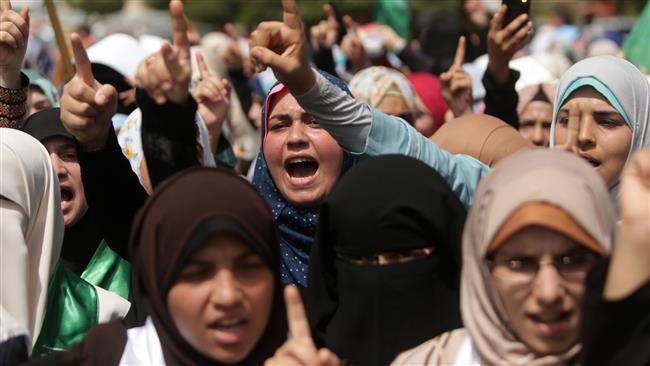Hundreds of Palestinians have held a demonstration in the blockaded Gaza Strip in protest against the Israeli regime’s latest attack on the al-Aqsa Mosque compound in East al-Quds (Jerusalem).
During the protest rally, which was called by the Palestinian resistance movement, Hamas, the demonstrators chanted anti-Israeli slogans and called on the Arab League to take action against the attack.
In an address to the crowd, Hamas official Mushir al-Masri, condemned the Israeli regime’s Sunday raid on the holy site and the Palestinian worshipers inside.
 He further urged the Palestinian Authority to express support for the holy mosque and end its security cooperation with Israel.
He further urged the Palestinian Authority to express support for the holy mosque and end its security cooperation with Israel.
People also took to the streets of al-Quds to condemn Israel’s latest assault on the al-Aqsa Mosque.
Palestinian resistance groups in a joint statement have also called for protests on Friday in condemnation of the attack.
Earlier in the day, Israeli forces stormed the holy site and clashed with the Palestinians inside.According to Palestinian witnesses, Israeli forces entered the mosque and caused damage.
The clashes broke out hours before Rosh Hashanah, or the Jewish New Year. The Israeli regime usually imposes restrictions on Muslim worshipers’ access to the al-Aqsa Mosque on the first days of Rosh Hashanah.
Palestinians say the Israeli regime is planning to change the status quo of al-Quds and Judaize the city.
Hunger striking Palestinian prisoner denied treatment
 On the other hand, Israeli authorities have refused to provide treatment to a Palestinian hunger striking prisoner, who is suffering from a chronic brain disease.
On the other hand, Israeli authorities have refused to provide treatment to a Palestinian hunger striking prisoner, who is suffering from a chronic brain disease.
On Sunday, an unnamed lawyer with the Palestinian Prisoner’s Society said in a statement that the Israeli Prison Service had denied Bilal Dawoud, 26, treatment.
Held in custody since February, Dawoud began his hunger strike on August 24 in protest against his so-called administrative detention.
The statement added that six other Palestinians are also on open-ended hunger strike.
According to prisoners’ rights group Addameer, there are currently some 400 Palestinians in Israeli prisons under Tel Aviv’s controversial policy of administrative detention, which allows the imprisonment of Palestinians without charge or trial for an indefinite amount of time.
Addameer says Palestinian prisoners “are often prescribed painkillers without thorough medical follow-up” and that it sometimes takes weeks or months before they are transferred to hospitals.
Last month, the administrative detention of Palestinian prisoner Mohammed Allan was suspended after 65 days of a hunger strike nearly claimed his life.
Over 7,000 Palestinians are reportedly incarcerated in 17 Israeli prisons and detention centers, many of them without charge or trial or access to lawyers.
PRESS T.V
R.S

